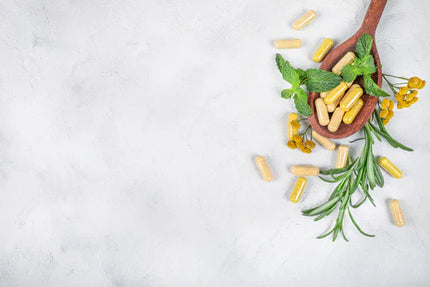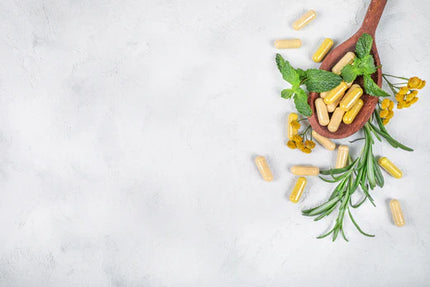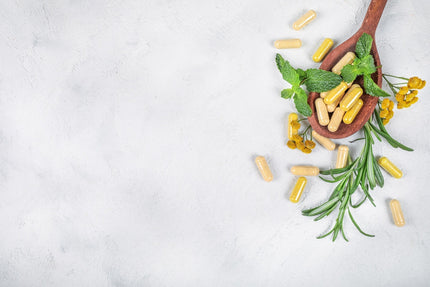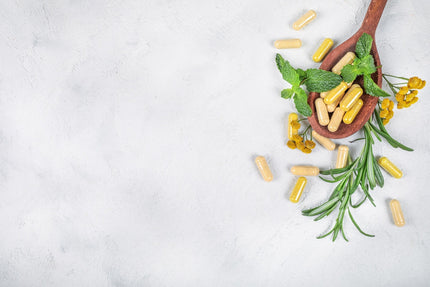Nutrients That May Assist
Coenzyme Q10
Ubiquinol-10
Actions
- Support energy synthesis
- Reduce oxidative stress
- Cardioprotective
- Hypotensive
- Prevent statin-induced cardiomyopathy
- Improve fertility
- Prevent migraine
Clinical Applications
- Fatigue
- Hypertension
- Statin medication use
- Fertility and sperm health
- Migraine
Enhanced Bioavailability Ubiquinol for Energy and Cardiovascular Health
The vast majority of all bodily processes rely on energy in the form of adenosine triphosphate (ATP). In the mitochondria, coenzyme Q10 (CoQ10) is a key component of the mitochondrial respiratory chain for the production of ATP, and is found in both the reduced and oxidised forms.[1,2] The two main functions of CoQ10 are energy production and antioxidant protection. Supplementation with CoQ10 may therefore support effective mitochondrial ATP production and reduce oxidative stress (OS).[3,4] This essential nutrient may also be used to support cardiovascular health.
Endogenous production of CoQ10 declines after the age of 30, making us more dependent on dietary and supplemental sources.[5] Several factors can compromise an individual’s ability to convert ubiquinone to ubiquinol, including high levels of OS, ageing, chronic disease, statin intake and increased metabolic demand.[6-8] Further to this, genetic polymorphisms within enzymes involved in the conversion of ubiquinone to ubiquinol can reduce CoQ10 status.[9] As a result, individuals with high levels of OS, chronic disease, or genetic polymorphisms may respond favourably to ubiquinol supplementation, to overcome limitations with CoQ10 regeneration. Figure 1 outlines the benefits and clinical applications of ubiquinol.

Figure 1: The benefits and clinical applications of ubiquinol.
The efficiency of absorption of orally administered CoQ10 is poor due to its insolubility in water and relatively large molecular weight.[6,10] The chemical instability of CoQ10 upon exposure to air, ultraviolet (UV) light and temperature can also influence the potency of CoQ10.[6] As a result, manufacturing processes often implement methods to enhance absorption whilst avoiding degradation, such as specialised delivery systems and encapsulation.[6]Due to its hydrophobic nature, CoQ10 also has a slow dissolution rate, meaning that it is unable to disperse easily within the digestive tract.[6] VESIsorb®, an innovative colloidal delivery system, effectively increases plasma CoQ10 levels. In a study conducted by Liu and colleagues, VESIsorb® enhanced the bioavailability of CoQ10 by up to 622% (Figure 2).[11]

Figure 2: Changes in plasma CoQ10 concentrations after a single oral intake of 120 mg CoQ10.[11]
Actions
Support energy synthesis
The primary role of CoQ10 is to participate in redox reactions within the electron transport chain (ETC), the biochemical pathway of oxidative phosphorylation, which occurs in mitochondria, and from which metabolic energy in the form of ATP is produced.[12] Since most cellular functions depend on ATP, CoQ10 is essential for the healthy function of all human tissues and organs.
Reduce oxidative stress
With a highly effective antioxidant capacity, CoQ10 serves to protect mitochondrial membranes from free radical damage.[13] CoQ10 has been shown to prevent both membrane oxidation and lipid peroxidation, as well as promoting the regeneration of another important antioxidant, α-tocopherol.[13-16]
Cardioprotective
Due to its properties as an antioxidant and regulator of core cellular energy processes, CoQ10 is critical to support cardiovascular function, with cardiac cells in particular extremely sensitive to deficiency.[5] Indeed, deficiency of CoQ10 is also associated with conditions such as heart failure (HF)and subclinical cardiomyopathy.[17,18]
Hypotensive
CoQ10 has been shown to protect endothelial cells and their mitochondria against the loss of electrons and preserve vascular integrity by decreasing OS.[19] This has important implications for both everyday vascular function, including appropriate vasodilation to maintain normal blood pressure and circulation control, as well as the prevention of future atherosclerotic lesion development. Damaged mitochondria may also disturb calcium homeostasis, which in turn could contribute to excessive vasoconstriction and hypertension.[20] In addition, the availability of nitric oxide (NO) in the endothelium is highly dependent on local levels of OS. CoQ10 may decrease the rate of NO inactivation, which regulates blood pressure by dilating the arteries, affecting vascular function indirectly via the inhibition of oxidative damage to LDL.[21]
Prevent statin-induced cardiomyopathy
A potential consequence of statin medication use is cardiomyopathy, the result of statin-induced impairment of heart muscle function. Statin-induced cardiomyopathy is a result of mitochondrial dysfunction due to statin depletion of CoQ10 and ATP, and may occur after six or more years of statin therapy.[22]
Improve fertility
High levels of OS are associated with the pathophysiology of male infertility, including abnormal sperm development, function and fertilising potential, as well as damage to sperm DNA.[23] As an antioxidant, CoQ10 as ubiquinol, has been found to protect sperm from ROS, and improve sperm count and motility.[24] CoQ10’s role in mitochondrial energy production is also important for sperm maturation.[23] The ubiquinol form of CoQ10 has also been investigated to protect against the high ROS and low antioxidant status observed in the sera and peritoneal fluid of women with idiopathic infertility and amenorrhoea.[24]
Prevent migraine
Serum levels of CoQ10 are found to be low in migraine sufferers and mitochondrial dysfunction appears to play a fundamental role in the pathogenesis of migraines. NO and matrix metalloproteinases (MMPs), particularly MMP-9, also tend to be higher in migraineurs. Elevated levels of both increase the permeability of the blood brain barrier (BBB), a significant precursor of migraine attacks.[25] CoQ10 prevents the activation of inflammatory signaling pathways, as well as attenuating NO production and MMP expression and activity.[25]
Clinical Applications
Fatigue
Mitochondrial dysfunction has been clearly identified as an important underlying mechanism of fatigue, and defects such as lowered ATP production are reported to play a role in the development of myalgic encephalomyelitis/chronic fatigue syndrome (ME/CFS).[26,27] Levels of CoQ10 have been demonstrated to be significantly lower in patients with ME/CFS compared to healthy controls, and the deficiency of this important antioxidant may play a role in the inflammatory pathways in these conditions.[28]
A systematic review of interventional studies assessed the impact of supplemental CoQ10 on fatigue. Ten of the 16 studies selected demonstrated significant beneficial effects of CoQ10, improving fatigue in otherwise healthy people as well as those with fatigue related to fibromyalgia, statin use, multiple sclerosis (MS) and end stage HF.[29]
Table 1 provides a summary of additional research studies on CoQ10 and fatigue.
Table 1: Beneficial effects of coenzyme Q10 for fatigue.
|
Dose of CoQ10 |
Population |
Summary of Results |
|
100 mg/d for three months
|
20 women with ME/CFS who required bed rest after mild exercise. Eighty per cent had low CoQ10. Compared to 20 sedentary sex-, age-, and weight-matched normal controls. |
Ninety per cent doubled their exercise tolerance and experienced reduction and/or disappearance of fatigue symptoms and 85% had decreased post-exercise fatigue.[30] |
|
150 mg/d or placebo for 12 weeks
|
31 patients with CFS. |
Patients showed improvements in autonomic nervous function, cognitive function, sleep quality and depressive symptoms.[31] |
|
500 mg/d or placebo for 12 weeks |
48 patients with MS. |
Reduced fatigue and depression.[32] |
Hypertension
A meta-analysis of 12 clinical trials concluded CoQ10 has the potential to significantly lower systolic blood pressure (SBP) by up to 17 mmHg, and diastolic blood pressure (DBP) by up to 10 mmHg in hypertensive patients.[33] Studies have shown that 51% of patients were able to cease at least one antihypertensive medication following CoQ10 supplementation over an average of 4.4 months, with doses ranging from 75 to 360 mg/d.[18] Additionally, significant reductions in SBP were seen in patients with systolic hypertension taking 60 mg/d.[34] CoQ10 has also been shown to attenuate salt-induced hypertension in animals.[35]
A summary of clinical trials demonstrating the role of CoQ10 in CVD is provided in Table 2.
Table 2: Beneficial effects of coenzyme Q10 on cardiovascular health.
|
Dose of CoQ10 |
Population |
Summary of Results |
|
200 mg/d or placebo for 12 weeks |
52 patients with hyperlipidaemia and MI |
Improved ratio of LDL: high density lipoprotein (HDL), improved blood pressure and serum HDL.[36] |
|
300 mg/d or placebo for eight weeks |
56 patients with ischaemic left ventricular systolic dysfunction (LVSD) |
Improved mitochondrial function and flow-mediated dilation (FMD), indicating CoQ10 improved endothelial function by reversing mitochondrial dysfunction in patients with ischaemic LVSD.[37] |
|
Two year prospective trial of 100 mg three times daily or placebo in addition to standard therapy |
420 patients with moderate to severe congestive HF |
Reduced major adverse cardiovascular events including cardiovascular deaths and hospital stays, significantly reduced morbidity, mortality, and improved functional capacity, and quality of life.[17] |
|
120 mg/d for 12 months |
73 (CoQ10, group A) and 71 (B vitamin, group B) patients after acute MI |
CoQ10 group A had half the number of follow up cardiac events and reported significantly less fatigue. Increases of plasma vitamin E and HDL in group A and both groups showed reduced LDL.[38] |
Statin medication use
HMG-CoA reductase inhibitors, commonly referred to as statins, inhibit cholesterol synthesis by repressing HMG-CoA reductase and mevalonic acid, a precursor in the production of CoQ10 in all cells.[7] As statins share the hepatic mevalonic synthesis pathway with cholesterol, circulating CoQ10 levels are reduced by statin medication,[36] with numerous studies consistently demonstrating the need for supplemental CoQ10 alongside statin medication.[39] In a study with 50 patients treated with statins and reporting muscle pain, half received 50 mg of CoQ10 twice daily for 30 days whilst the control group received a placebo. ACoQ10 supplementation was demonstrated to notably reduce statin-related muscle symptoms by 75%, with no changes observed in the placebo group.[40] Supplementation with CoQ10 has been shown to prevent statin-induced CoQ10 depletion, without affecting the cholesterol-lowering effects of this medication.[41]
Fertility and sperm health
A study recruited 60 men aged between 20 to 40 years with oligospermia who were supplemented with ubiquinol at 150 mg/d for six months. Their testosterone levels and sperm parameters were measured at baseline and each month until the end of six months. At the end of the study, their total sperm count had increased by 53% and total sperm motility by 41%.[24] These results are supported by two earlier clinical studies demonstrating that ubiquinol improved sperm density, sperm motility and sperm morphology.[42, 43]
In another study, 30 women, aged 20 to 40 years with amenorrhoea and infertility, were supplemented with 150 mg/d of ubiquinol for four months and compared to 30 healthy women as controls.[24] The results demonstrated that FSH levels were increased up to three times but remained within normal limits, while LH values were double the normal range, indicating that CoQ10 reduced the oxidative stress influencing the concentrations of these two important reproductive hormones.[24]
Migraine
A randomised, double-blind, placebo-controlled trial was conducted with 46 women, aged 20 to 50 years, who suffered from migraines.[25] They were randomly assigned to receive either 400 mg/d of ubiquinol or placebo for 12 weeks. Supplementation with ubiquinol was found to significantly reduce the frequency, severity and duration of migraine attacks compared to placebo. In addition, treatment with ubiquinol significantly reduced serum levels of lactate, pyruvate, and NO. Serum CoQ10 levels were also found to have increased after 12 weeks.[25]
Safety Information
Disclaimer: In the interest of supporting Healthcare Practitioners, all safety information provided at the time of publishing is in accordance with Natural Medicine Database (NATMED PRO), renowned for its professional monographs which include a thorough assessment of safety, warnings, and adverse effects.
For further information on specific interactions with medications, please contact Clinical Support on 1800 777 648, or via email, anz_clinicalsupport@metagenics.com
Pregnancy and Lactation
- Insufficient reliable information available; avoid using.[44]
Contraindications
- None listed.[44]
References
[1] Alcazar-Fabra M, Navas P, Brea-Calvo G. Coenzyme Q biosynthesis and its role in the respiratory chain structure. Biochim Biophys Acta. 2016;1857(8):1073-1078. doi:10.1016/j.bbabio.2016.03.010
[2] Saini R. Coenzyme Q10: the essential nutrient. J Pharm Bioallied Sci. 2011;3(3):466-7. doi:10.4103/0975-7406.84471
[3] Yang YK, Wang LP, Chen L, et al. Coenzyme Q10 treatment of cardiovascular disorders of ageing including heart failure, hypertension and endothelial dysfunction. Clin Chim Acta. 2015;450:83-9. doi:10.1016/j.cca.2015.08.002
[4] Sohal RS, Forster MJ. Coenzyme Q10, oxidative stress and ageing. Mitochondrion. 2007;7:S103-S11. doi:10.1016/j.mito.2007.03.006
[5] Kumar A, Kaur H, Mohan V. Role of coenzyme Q10 (CoQ10) in cardiac disease, hypertension and Meniere-like syndrome. Pharmacol Ther. 2009 Dec;124(3):259-68. doi: 10.1016/j.pharmthera.2009.07.003.
[6] Zaki NM. Strategies for oral delivery and mitochondrial targeting of CoQ10. Drug Deliv. 2016;23(6):1868-81. doi:10.3109/1071544.2014.993747
[7] Deichmann R, Lavie C, Andrews S. Coenzyme Q10 and statin-induced mitochondrial dysfunction. Ochsner J. 2010;10(1):16-21. PMID:21603349.
[8] Yamamoto Y, Yamashita S. Plasma ubiquinone to ubiquinol ratio in patients with hepatitis, cirrhosis and hepatoma, and in patients treated with percutaneous transluminal coronary reperfusion. Biofactors. 1999;9(2-4):241-6. PMID:10416036.
[9] Fischer A, Schmelzer C, Rimbach Get al. Association between genetic variants in the Coenzyme Q10 metabolism and Coenzyme Q10 status in humans. BMC Res Notes. 2011;4:245. doi: 10.1186/1756-0500-4-245
[10] Bhagavan HN, Chopra R. Coenzyme Q10: absorption, tissue uptake, metabolism and pharmacokinetics. Free Radic Res. 2006;40(5):445-53. doi:10.1080/10715760600617843
[11] Liu ZX, Artmann C. Relative bioavailability comparison of different coenzyme Q10 formulations with a novel delivery system. Altern Ther Health Med. 2009;15(2):42-6. PMID:19284181.
[12] Sharma A, Fonarow GC, Butler J, et al. Coenzyme Q10 and heart failure: a state-of-the-art review. Circ Heart Fail. 2016;9(4):e002639. doi:10.1161/CIRCHEARTFAILURE.115.002639
[13] Olek S, Ventura HO. Coenzyme Q10 and utility in heart failure: just another supplement? Curr Heart Fail Rep. 2016;13(4):190-5. doi: 0.1007/s11897-016-0296-6
[14] DiNicolantonio JJ, Bhutani J, McCarty MF, et al. Coenzyme Q10 for the treatment of heart failure: a review of the literature. Open Heart. 2015;2(1):e000326. doi:10.1136/openhrt-2015-000326
[15] Ayer A, Macdonald P, Stocker R. CoQ10 function and role in heart failure and ischaemic heart disease. Annu Rev Nutr. 2015;35:175-213. doi:10.1146/annurev-nutr-071714-034258
[16] Yang YK, Wang LP, Chen L, et al. Coenzyme Q10 treatment of cardiovascular disorders of ageing including heart failure, hypertension and endothelial dysfunction. Clin Chim Acta. 2015;450:83-9. doi:10.1016/j.cca.2015.08.002
[17] Mortensen SA, Rosenfeldt F, Kumar A, et al. The effect of Coenzyme Q10 deficiency on morbidity and mortality in chronic heart failure. JACC Heart Fail. 2014;2(6):641-9. doi:10.1016/j.jchf.2014.06.008
[18] Langsjoen PH, Langsjoen AM. The clinical use of HMG CoA reductase inhibitors and the associated depletion of co-enzyme Q10. A review of animal and human publications. Biofactors. 2003;18(1-4):101-111. doi:10.1002/biof.5520180212
[19] Jankowski J, Korzeniowska K, Cieslewicz A, et al. Coenzyme Q10 - a new player in the treatment of heart failure? Pharmacol Rep. 2016;68(5):1015-9. doi:10.1016/j.pharep.2016.05.012
[20] Tang X, Luo YX, Chen HZ, et al. Mitochondria, endothelial cell function, and vascular diseases. Front Physiol. 2014;5:175. doi:10.3389/fphys.2014.00175
[21] Yang YK, Wang LP, Chen L, et al. Coenzyme Q10 treatment of cardiovascular disorders of ageing including , hypertension and endothelial dysfunction. Clin Chim Acta. 2015;450:83-9. doi:10.1016/j.cca.2015.08.002
[22] Okuyama H, Langsjoen PH, Hamazaki T, et al. Statins stimulate atherosclerosis and heart failure: pharmacological mechanism. Expert Rev Clin Pharmacol. 2015;8(2):189-99. doi:10.1586/17512433.2015
[23] Omar MI, Pal RP, Kelly BD, et al. Benefits of empiric nutritional and medical therapy for semen parameters and pregnancy and live birth rates in couples with idiopathic infertility: a systematic review and analysis. Eur Urol. 2019;75(4):615-625. doi:10.1016/j.eururo.2018.12.022
[24] Thakur AS, Littarru GP, Funahashi I, et al. Effect of ubiquinol therapy on sperm parameters and testosterone levels in oligoasthenozoospermic infertile men. J Clin Diagn Res. 2015;9(9):BC01-3. doi:10.7860/JCDR/2015/13617.6424
[25] Nattagh-Eshtivani E, Dahri M, Hashemilar M, et al. The effect of coenzyme Q10 supplementation on serum levels of lactate, pyruvate, matrix metalloproteinase 9 and nitric oxide in women with migraine. A double blind, placebo, controlled randomised trial. Eur J Int Med. 2018;21:70-76. doi:10.1016/j.eujim.2018.06.009
[26] Filler K, Lyon D, Bennett J, et al. Association of mitochondrial dysfunction and fatigue: a review of the literature. BBA Clin. 2014;1:1:12-23. doi:10.1016/j.bbacli.2014.04.001
[27] Morris G, Maes M. Mitochondrial dysfunctions in myalgic encephalomyelitis/chronic fatigue syndrome explained by activated immune-inflammatory, oxidative and nitrosative stress pathways. Metab Barin Dis. 2014;29(1):19-36. doi:10.1007/s11011-013-9435-x
[28] Maes M, Twisk FN. Why myalgic encephalomyelitis/chronic fatigue syndrome (ME/CFS) may kill you: disorders in the inflammatory and oxidative stress and nitrosative stress (IO&NS) pathways may explain cardiovascular disorders in ME/CFS. Neuro Endocrinol Lett. 2009;30(6):677-93. PMID: 20038921.
[29] Mehrabani S, Askari G, Miraqhajani M, et al. Effect of coenzyme Q10 supplementation on fatigue: a systematic review on interventional studies. Complement Ther Med. 2019;43:181-187. doi:10.1016/j.ctim.2019.01.022
[30] Werbach MR. Nutritional strategies for treating chronic fatigue syndrome. Altern Med Rev. 2000;5(2):93-108. PMID: 10767667.
[31] Fukuda S, Nojima J, Kajimoto O, et al. Ubiquinol-1- supplementation improves autonomic nervous function and cognitive function in chronic fatigue syndrome. Biofactors. 2016;42(4):431-40. doi:10.1002/biof.1293
[32] Sanoobar N, Dehghan P, Khalili M, et al. Coenzyme Q10 as a treatment for fatigue and depression in multiple sclerosis patients: a double blind randomised clinical trial. Nutr Neurosci. 2016;19(3):138-43. doi:10.1179/1476830515Y.0000000002
[33] Rosenfeldt FL, Haas SJ, Krum H, et al. Coenzyme Q10 in the treatment of hypertension: a meta-analysis of the clinical trials. J Hum Hypertens. 2007;21(4):297-396. doi:10.1038/sj.jhh.1002138
[34] Burke BE, Neuenschwander R, Olson RD. Randomised, double-blind, placebo-controlled trial of coenzyme Q10 in isolated systolic hypertension. South Med J. 2001;94(11):1112-7. doi:10.1097/00007611-200111000-00015
[35] Gao HL, Yu XJ, Qi J, et al. Oral CoQ10 attenuates high-salt induced hypertension by restoring neurotransmitters and cytokines in the hypothalamic pituitary nucleus. Sci Rep. 2016;6:30301. doi:10.1038/srep30301
[36] Mohseni M, Vafa MR, Hajimiresmail SJ, et al. Effects of CoQ10 supplementation on serum lipoproteins, plasma fibrinogen, and blood pressure in patients with hyperlipidaemia and myocardial infarction. Iran Red Crescent Med J. 2014;16(10):e16433. doi:10.5812/ircmj.16433
[37] Dai YL, Luk TH, Yiu KH, et al. Reversal of mitochondrial dysfunction by coenzyme Q10 supplement improves endothelial function in patients with ischaemic left ventricular systolic dysfunction: a randomised controlled trial. Atherosclerosis. 2011;216(2):395-401. doi:10.1016/j.atherosclerosis.2011.02.013
[38] Singh RB, Neki NS, Kartikey K, et al. Effect of coenzyme Q10 on risk of atherosclerosis in patients with recent myocardial infarction. Mol Cell Biochem. 2003;246(1-2):75-82. PMID: 12841346.
[39] Banach M, Serban C, Ursoniu S, et al. Statin therapy and plasma coenzyme Q10 concentration – a systematic review and meta-analysis of placebo-controlled trials. Pharmacol Res. 2015;99:329-36. doi:10.1016/j.phrs.2015.07.008
[40] Skarlovnik A, Janic M, Lunder M, et al. Coenzyme Q10 supplementation decreases statin-related mild-to-moderate muscle symptoms: a randomised clinical study. Med Sci Monit. 2014;20:2183-8. doi:10.12659/MSM.890777
[41] Bargossi AM, Grossi G, Fiorella PL, et al. Exogenous CoQ10 supplementation prevents plasma ubiquinone reduction induced by HMG-CoA reductase inhibitors. Mol Aspects Med. 1994;15 Suppl:s187-93. doi:10.1016/0098-2997(94)90028-0
[42] Safarinejad MR, Safarinejad S, Shafiei N, et al. Effects of the reduced form of coenzyme Q10 (ubuiquinol) on semen parameters in men with idiopathic infertility: a double-blind, placebo controlled, randomised study. J Urol. 2012;188(2):526-31. doi:10.1016/j.juron.2012.03.131
[43] Cakiroglu B, Eyyupoglu SE, Gozukucuk R, et al. Ubiquinol effect on sperm parameters in subfertile men who have astheno-teratozoospermia with normal sperm concentration. Nephrourol Mon. 2014;6(3):e16870. doi:10.5812/numonthly.16870
[44] Natural Medicines Database. AusDi; 2024. Accessed September 20, 2024. https://ausdi.hcn.com.au/




